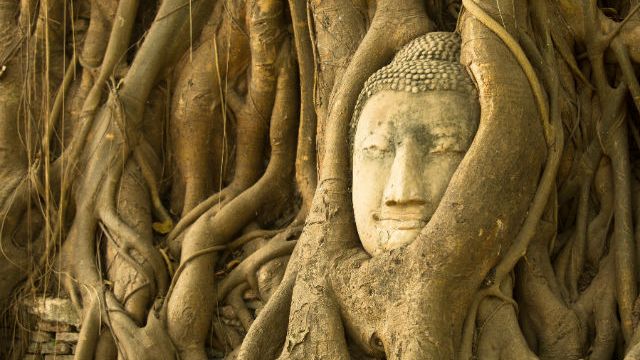Post 2: Buddhism in History. Above It All, or In The Thick Of It?

(Disclaimer: In a week long series of posts, I will air my thoughts and complaints about Buddhism, and in particular about the reductionist Western conception of Buddhism. I do so in good faith, and having sought out the responses of the most educated Buddhists and Buddhism scholars I know. So, while this is an attack, I request that it not be rejected out of hand simply for being an attack.
I believe that Buddhism is a religion just like any other. That means that it is a superstitious faith position, which in turn means that it can, by its nature, be used to ground claims without evidence, inspire fanaticism, and justify anything at all.
Regardless of the claims in my analysis, I humbly request of my readers that open-discussion be met with open-mindedness, as I am happy to report I found in the Buddhism scholars and devotees whom I have spoken to while researching this series.)
The reverence and sanctimoniousness with which Buddhism is talked about around me is ultimately rooted in one thing: the belief that Buddhists are somehow specially exempt from the habitual human vices of violence, greed, war, dictatorship and terrorism.
It is entirely possible to be aware of Buddhist history and still think that Buddhism, as a religion or a way of life, breeds nonviolence. That is, unless you are aware of any of the content of that history. I may be kicking it, but Buddhism is no puppy:
Lost in the ongoing drivel from both sides of the debate about the moral status of the atomic bombing of Hiroshima and Nagasaki is the role of fanatical Buddhism in precipitating the situation in the first place.
In fact, the issue really forestalling the Japanese surrender was the unwillingness of Allied command to accept a surrender with just one condition, or, flipped, the fanatical, Japanese unwillingness to relinquish just one condition.
That one condition was that Emperor Hirohito be allowed to stay in place as the god-king of the screeching Buddhist death cult which motivated the Japanese military to invade Manchuria in 1931, called for The Rape of Nanjing, compelled the abduction and sometimes-sexual enslavement of over 300,000 Korean women (along with a a preexisting and still-existent Japanese culture of regarding Koreans as sub-human), and justified the Divine Wind (Kamikaze) methodology employed by the Japanese air force. This history is definitively and closely dealt with in the inimitable Zen at War.
This fanaticism, far from representing the blasé type of cultish leader-worship that any historian of the last century is sickeningly accustomed to, was also bolstered by the near complete complicity of the Buddhist clergy, exemplary among them the crazed D.T. Suzuki.
So yes, an entire army on the wrong side of what Kurt Vonnegut (and The Dalai Lama) calls the West’s last “just war” was Buddhist. Go figure.
But while Buddhism’s many Western apologists have an excuse for their ignorance of history in the case of Japan (it is not taught in most schools, and Hirohito is also often presented as a primarily Shinto leader, which he was too), they have no such luck with Sri Lanka.
The violence between Sinhalese Buddhists and Tamils there, employing, (you guessed it) terrorist tactics, enjoys the type of blind eye in The West that only the religiously motivated can turn.
There can be, though, a certain saving grace, even in a religious civil war. That grace is the struggle against a bigger tyranny of an ethnic or religious minority to create a free and self-governed and politically separate state, even if both sides employ ruthless guerrilla tactics.
Too bad, then, that the thuggish Sinhalese Buddhists are the majority, and all but call for the extermination of the minority Tamils (and their equally thuggish fighting force, the Tamil Tigers).
So no, Buddhists are not immune to the violent and factionalist tendencies that all human groups are guilty of. To say that they are is to ignore both the pride and the shame of many peoples’ histories.
Image credit: Darren Brode / Shutterstock.com





